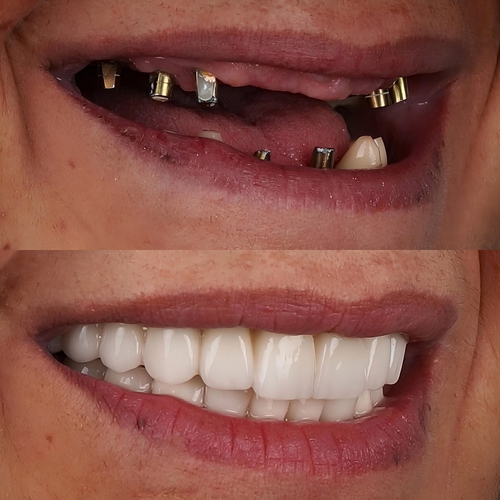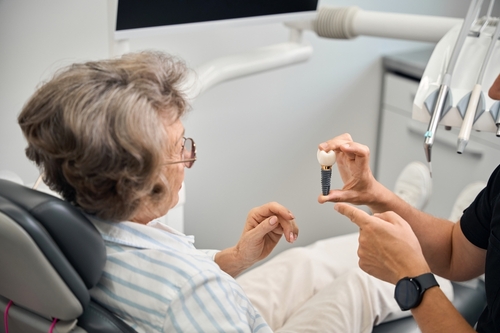
When teeth are missing, the impact extends beyond appearance. Everyday things like eating, smiling, and even speaking can feel different. If you are considering treatment in Mira Mesa and looking for a dental implant specialist, one of your questions may be how implants will affect your speech. The reality is that dental implants are built to restore natural function. While there is a short period of adjustment, most people find that their ability to speak not only returns but often improves compared to before.
Will dental implants change how I speak?
It is common to notice subtle differences in speech right after implant surgery. These changes are usually temporary, and with time your tongue and lips adapt. Knowing what to expect makes it easier to understand the process of speech changes after dental implants.
1. Early adjustments
In the first few days or weeks, your tongue may need to learn the feel of the new teeth. Sounds like “s,” “f,” and “th” can feel awkward at first because they depend on precise tongue placement. These small challenges typically fade as your muscles adjust. Most patients report steady improvement over two to four weeks, showing that adjusting to speech with implants is a natural step in the process.
2. Bite alignment and clarity
The way your teeth meet, known as your bite, plays an important role in speech. If the crowns are shaped or positioned slightly differently from your natural teeth, you might notice temporary changes in clarity. Dentists often fine tune crown height or shape to create a smoother path for your tongue. These refinements can make a clear difference in dental implants and pronunciation, helping you regain confidence more quickly.
3. Confidence in conversation
Missing teeth can make people self conscious, leading them to avoid speaking up. Once implants are in place and speech begins to normalize, that hesitation often fades. People find themselves more at ease in both casual conversations and professional settings. This improvement highlights how voice clarity after tooth implants can restore both function and confidence in daily life.
Can implants help me talk more clearly than dentures?
For many patients, implants actually improve speech compared to removable dentures. The difference comes down to how secure they feel, which directly affects talking with dental implants vs dentures.
1. Stability during speech
Removable dentures sometimes slip or move when talking, especially bottom dentures that rely on suction rather than a fixed anchor. Even slight movement can make words sound less sharp. Dental implants are anchored directly into the jawbone, which means they stay in place at all times. That stability makes a noticeable difference for people who have struggled with denture movement.
2. Airflow and sound formation
Clear speech depends on predictable airflow through the mouth. When dentures shift, the tongue has to constantly adjust, which can blur sounds. With implants, the teeth remain steady, giving your tongue a consistent surface to work against. Many patients notice specific improvements in sounds like “sh,” “ch,” and “t.” This explains why voice clarity after tooth implants is often stronger than what dentures provide.
3. Everyday reliability
Dentures can sometimes cause sore spots or gum irritation, especially after long conversations. That discomfort makes it harder to speak freely or at length. Implants remove this concern since they feel and function like natural teeth. People often describe them as “forgetting they are there,” which shows why implants for many offer not only comfort but also more natural communication in daily life.
How long does it take to get used to talking with implants?
The adjustment period varies, but most patients adapt within a few weeks to a few months. During this time, small habits and consistent practice can speed up speech adaptation after implant surgery.
1. Practicing at home
Simple exercises make a big difference. Reading out loud for ten minutes a day or practicing tongue twisters trains your tongue and lips to work with the new teeth. Singing along to music is another way to practice without pressure. These activities accelerate progress and help with adjusting to speech with implants in a comfortable, low-stress way.
2. Role of dental follow-ups
Follow-up visits are essential, especially if you feel certain words remain tricky. Your dentist can adjust the shape or alignment of the crowns so that your tongue has the right space to move. Even minor refinements can make a noticeable change in dental implants and pronunciation. This shows how ongoing support plays a direct role in your overall comfort.
3. Reaching full adaptation
Most patients report that once healing is complete and permanent crowns are in place, they speak as clearly as they did before tooth loss. In many cases, their speech is actually clearer than it was with dentures or missing teeth. This steady improvement shows that speech changes after dental implants are almost always temporary and give way to long-term clarity.
Extra tips for a smooth transition
While implants naturally integrate into daily speech, there are simple strategies that can help you adjust more quickly. These focus on awareness, practice, and patience.
1. Be patient with progress
It’s normal to notice small slips in the beginning. Give yourself time, knowing that the muscles of your mouth are relearning familiar patterns. Most people notice big strides in the first month, followed by steady fine-tuning. Recognizing that speech adaptation after implant surgery takes time can make the process feel less frustrating.
2. Practice in real situations
The more you use your implants in conversation, the faster you adapt. Engage in regular discussions, take phone calls, and practice speaking in front of a mirror. These real-world moments help solidify the changes more effectively than practice alone. Over time, talking with dental implants vs dentures will feel natural in every setting.
3. Protect overall oral health
Healthy gums and bone support the stability of your implants, which in turn supports clear speech. Good daily hygiene and regular dental visits are important for long-term results. Protecting your implants ensures that voice clarity after tooth implants remains consistent for years to come.
Where in Mira Mesa and the vicinity can I find an experienced dental implant specialist?
Temecula Center for Dental Implants is your reliable practice for dental implant care that restores your confidence in every smile. With Dr. Tsvetov, our experienced oral surgeon, you can count on skilled treatment and lasting results. You can also explore how genetics impact implants, whether athletes can get implants or not, or read about flying after getting dental implants for more guidance.
Imagine enjoying a walk with your renewed smile through Hourglass Community Park, knowing your teeth feel strong and natural. Call us today to schedule your consultation and start your journey toward better oral health.

